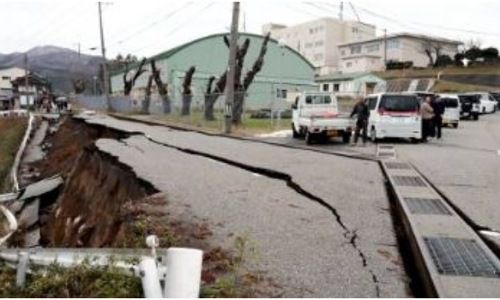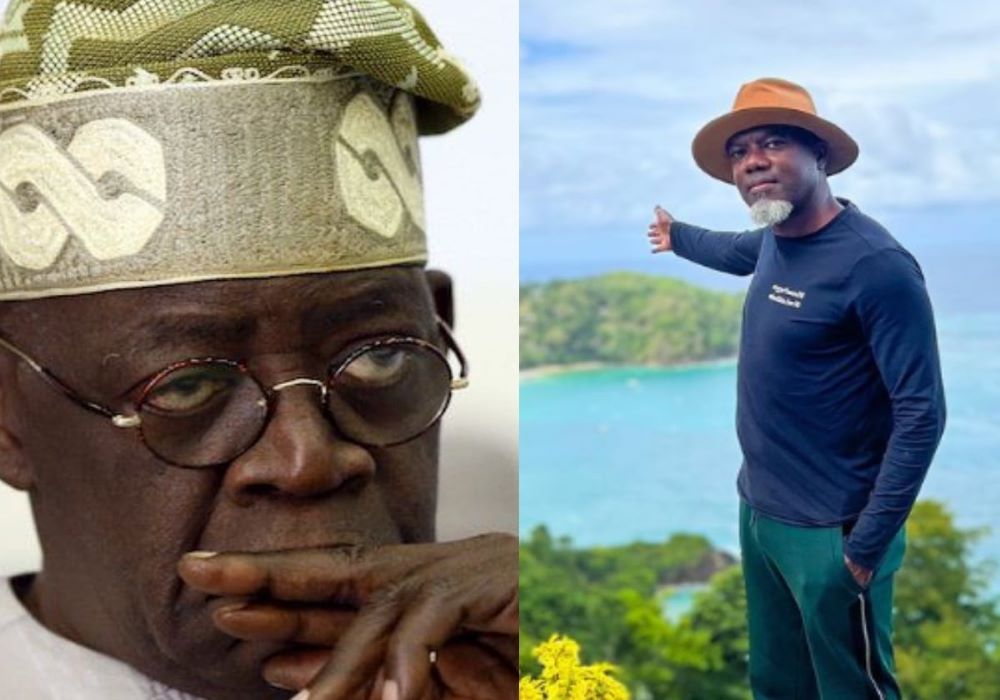International News
Strong Quake Hits Central Japan, Prompts Tsunami Alerts

Monday saw a forceful 7.5 magnitude earthquake hitting central Japan, according to the USGS.
The tremor triggered tsunami warnings, compelling local authorities to encourage residents in the vicinity to seek safer, elevated areas.
“All residents must evacuate immediately to higher ground,” national broadcaster NHK said after the quake hit the Noto region in Ishikawa prefecture around 4:10 pm (0710 GMT).
The Hawaii-based Pacific Tsunami Warning Center cautioned that dangerous tsunami waves could occur within 300 kilometres (190 miles) from the earthquake’s epicentre along the Japanese coast.
A confirmed tsunami measuring 1.2 metres was reported to have reached Wajima city in Ishikawa prefecture.
The Japan Meteorological Agency (JMA) anticipated a considerably higher tsunami of five meters to hit Noto in the same region.
The JMA reported a rapid sequence of earthquakes in the Noto region, situated on the Sea of Japan side of Japan’s main island of Honshu, starting with a 5.7 magnitude tremor at 4:06 pm local time.
Subsequent to this, a 7.6-magnitude quake occurred at 4:10 pm, followed by a 6.1 magnitude quake at 4:18 pm, a 4.5 magnitude quake at 4:23 pm, a 4.6 magnitude quake at 4:29 pm, and a 4.8 magnitude quake at 4:32 pm.
Shortly after, the US Geological Survey reported another quake with a magnitude of 6.2.
Broadcasters swiftly switched to special programming following the largest of the quakes, issuing urgent calls for affected residents to immediately move to higher ground.
A presenter on broadcaster NHk told viewers “We realise your home, your belongings are all precious to you, but your lives are important above everything else. Run to the highest ground possible.”
Japan has maintained a stringent construction regulations aimed at ensuring buildings are capable of withstanding powerful earthquakes and regularly conducts emergency drills to prepare for significant seismic events.
However, the country is haunted by the recollection of a colossal 9.0-magnitude undersea quake off northeastern Japan in March 2011.
This seismic event triggered a devastating tsunami, resulting in approximately 18,500 people reported dead or missing.
The 2011 tsunami additionally caused three reactors at the Fukushima nuclear plant to undergo meltdowns, resulting in Japan’s worst post-war disaster and the most severe nuclear incident since Chernobyl.
In March 2022, a 7.4-magnitude earthquake off the coast of Fukushima shook extensive regions of eastern Japan, resulting in the loss of three lives.
Tokyo suffered significant devastation from a massive earthquake a century ago in 1923.
International News
Samsung Electronics Co-CEO, Han Jong-hee Dies At 63

Han Jong-hee, co-CEO of Samsung Electronics and a driving force behind the company’s dominance in the global television market, has died of a heart attack at the age of 63, the company confirmed on Tuesday.
“He died from cardiac arrest today,” a Samsung spokesperson stated, adding that Han is survived by his wife and three children.
Having joined the company in 1988, Han played a significant role in shaping Samsung’s television business.
READ MORE: Samsung Reports Worst Quarterly Profits In 14 Years
His leadership was instrumental in the launch and success of the company’s high-end LED TVs, which helped establish Samsung as a global leader in the industry.
“Han was central in the unveiling of Samsung’s world-class LED TVs,” the company noted in a biography published earlier this month. “His numerous other innovations enabled the company to continually demonstrate its technology leadership.”
His efforts ensured that Samsung maintained its position as a dominant force in the global television market.
Han’s death comes at a time when Samsung Electronics is grappling with challenges in the AI chip sector.
The company has been facing difficulties in meeting Nvidia’s standards, while its South Korean competitor, SK Hynix, has emerged as the leading supplier of high-bandwidth memory (HBM) chips for Nvidia’s AI processors.
Chairman Lee Jae-yong recently underscored the urgency of the situation, urging Samsung to adopt a “do-or-die” approach to overcome the growing challenges in the AI industry.
Last October, the company acknowledged it was facing a “crisis,” citing concerns over its “fundamental technological competitiveness and the future of the company.”
International News
Pope Francis To Return To Vatican After Month-Long Treatment
Pope Francis will on Sunday be discharged from Rome’s Gemelli hospital, where he has been receiving treatment since February 14 for breathing difficulties and pneumonia.
The 88-year-old pontiff will return to his residence at Saint Martha’s House in the Vatican, where doctors have advised that he undergo “a long convalescence… of at least two months.”
Speaking to reporters on Saturday, Dr. Sergio Alfieri explained that while the pope’s health is improving, further recovery is best achieved at home.
READ ALSO: Pope Francis’ Condition Improving, Says Vatican
“Further progress will take place at his home, because a hospital — even if this seems strange — is the worst place to recover because it’s where one can contract more infections,” Alfieri said.
Dr. Luca Carbone, another physician at Gemelli, added that there are positive signs in the pope’s condition. “We hope that he will soon be able to resume his normal activities,” he stated.
Before leaving the hospital, Pope Francis is expected to greet the public and offer a blessing from a hospital balcony after the Angelus prayers on Sunday, marking his first appearance in weeks.
Speculation about a possible resignation has been circulating due to the pope’s prolonged absence from public duties, but Vatican officials have firmly denied such claims.
When asked if the topic had been discussed, Vatican Secretary of State Pietro Parolin was clear in his response: “No, no, no, absolutely not.”
The pope, who had part of a lung removed in his youth, has received an outpouring of prayers and well-wishes from Catholics worldwide.
Supporters have been gathering outside Gemelli hospital, leaving flowers, candles, and messages of encouragement.
His hospitalization, the longest of his papacy has led to questions about how Easter celebrations will be handled in his absence.
However, Vatican officials remain optimistic about his gradual return to his duties in the coming weeks.
International News
Memphis Man Accidentally Shot By His Own Dog

A Memphis man was accidentally shot by his own dog after the pet jumped onto his bed and triggered a loaded firearm, police confirmed on Wednesday.
The incident occurred early Monday morning while the man was asleep alongside his female partner.
According to police reports, the couple’s one-year-old pit bull, Oreo, inadvertently discharged the weapon after getting its paw stuck in the trigger guard.
READ ALSO: Nigerian Woman Mauled To Death By Stray Dogs In Italy
The bullet grazed the man’s left thigh, causing a minor injury that was treated at a local hospital.
The victim’s girlfriend, who spoke to Fox 13 Memphis, described Oreo as a playful dog and recounted the shocking moment the firearm discharged.
“The dog is a playful dog, and he likes to jump around and stuff like that, and it just went off,” she said. Reflecting on the incident, she added: “Keep the safety on or use a trigger lock.”
Police have classified the case as an “accidental injury” and have not disclosed the type of firearm involved.
Although gun-related incidents are frequent in the United States, cases involving animals firing weapons are rare.
In a similar case in 2023, a Kansas man was killed when his German shepherd stepped on a hunting rifle.
A comparable incident in 2018 saw an Iowa man accidentally shot in the leg by his pit bull-Labrador mix.
Authorities are using the Memphis case as a reminder of firearm safety, urging gun owners to secure their weapons properly to prevent unintended discharges.















Jeffrey Schuster
January 1, 2024 at 8:46 pm
Somebody essentially help to make significantly articles Id state This is the first time I frequented your web page and up to now I surprised with the research you made to make this actual post incredible Fantastic job